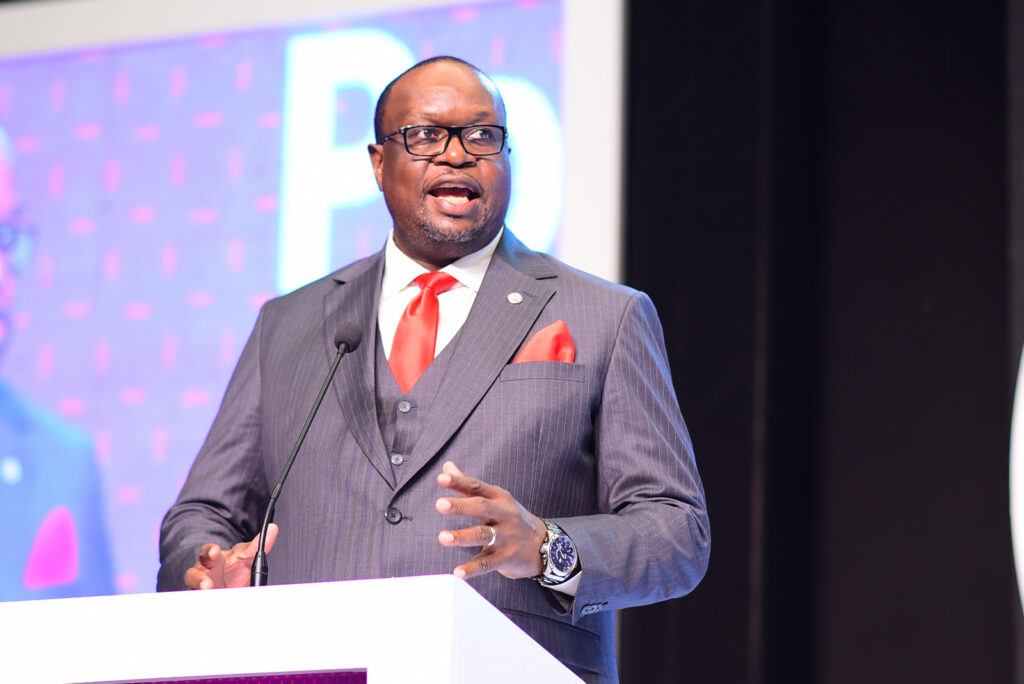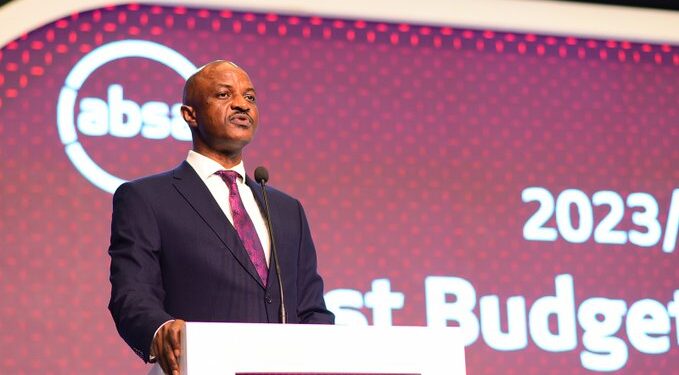The government will in the Financial Year 2023/24 redirect resources towards wealth creation by facilitating more Ugandans to join the money economy and accelerate the economy’s rapid expansion, the Finance Ministry Permanent Secretary/ Secretary to Treasury Ramathan Ggoobi has said.
Speaking at the 2023 Post Budget Dialogue organised by Absa Bank Uganda in partnership with Deloitte and NTV Uganda under the theme “Managing risks, vulnerabilities that await implementation of the FY 2023/24 National Budget”, Ggoobi said the government is looking to accelerate the full monetization of the economy to achieve socioeconomic transformation.
He noted that Key focus areas include the effective implementation of the Parish Development Model (PDM), upgrading of infrastructure, and continued support to the private sector to access affordable capital among others.
“We continue to support the private sector with to access affordable and patient capital through UDB, Agriculture Credit Facility, Small Business Recovery Fund, and Microfinance Support Centre on lending to SACCOs. A total of UGX 2.7 trillion is available under these activities,” he stated.
Other funds include the World Bank’s grant of $218m to export-oriented Small and Medium Enterprises (SMEs) and $ 217m for supporting Women-led enterprises.
On infrastructure, Ggoobi said that funds have been allocated for the Standard Guage Railway (SGR). He also said the Metre Guage Railway is also being finalised as well as stepping up the maintenance of the existing infrastructure.
“The other issue is building infrastructure such as water, reliable electricity, and roads in industrial parks such as Mbale, Kapeeka, and Buikwe. Government has also put in place deliberate efforts to support the sustainable exploration of oil resources and activities are ongoing benefitting various players in the value chain including several Ugandan contractors,” said Ggoobi.
The dialogue sought to identify risks and vulnerabilities in the implementation of the Financial Year 2023/24 National Budget which includes lower than anticipated tax revenues,
currently standing at only 14% of GDP according to Ggoobi, rising public debt, and the associated high costs of servicing the national debt, unpredictable weather patterns, further tightening of global financial conditions, and imported inflation among others.
The Absa Group Senior Economist Sub-Saharan Africa, Mpho Molopyane, said that Uganda’s growth will be boosted by the oil production which is estimated at 230,000 barrels per day, which is ahead of Gabon and Ghana.
According to Absa Group data, key developments in Uganda’s oil and gas sector include the commissioning of the Kingfisher field oil drilling, drilling at Tilenga (expected by the end of Quarter 3, 2023, FID on the refinery (expected by mid-2023), construction licenses for EAPCOP issued among others.
On inflation, Molopyane said that Uganda’s inflation is likely to continue trending lower and revert to target by Quarter 3, 2023.
“Moderating grain, fertilizer, and oil prices, coupled with easing supply chain constraints and improved weather conditions, should lead to a further drop in annual inflation. At the June meeting, The Bank of Uganda’s MPC noted that while inflationary pressures have eased, the inflation outlook remains sensitive to elevated risks.”
From a global perspective, the Absa Group data indicates that global growth is likely to slow for the second consecutive year, and the slowdown will be more pronounced in advanced economies.

The research data furthermore indicated that oil prices are below the peak, but they are likely to remain high on production cuts. Global policy rates will likely remain high to re-anchor inflation expectations, global inflation will moderate slowly and global rates likely to remain higher for longer.
In his remarks, Mumba Kalifungwa, Managing Director of Absa Bank Uganda applauded the Finance Ministry and Central Bank for using the fiscal and monetary tools respectively in curbing inflation.
He said the Annual Headline Inflation in May 2023 declined to 6.2% from 8.0% registered in April and 10.4% registered in January 2023.
“I remain optimistic that reduced inflation will ultimately lead to a reduction of goods and services in the long run and an improvement in livelihoods. Investors are more likely to make long-term investment decisions when they can confidently predict future costs and returns. This stability encourages both domestic and foreign investment, leading to increased business activity, job creation, and economic development,” said Kalifungwa.
The Absa Bank Uganda Executive Director/ Chief Finance Officer Michael Segwaya during the panel discussion explained that Uganda has had a stable exchange rate and if it continues, it will be a good business environment.
With this, he said the economy should be much better.
On Government’s domestic borrowing, Segwaya said, “Government is now cognizant that it can’t just continue borrowing domestically as these crowd out the private sector. This reduced appetite and a stable currency are good news for the private sector.”
Economic growth
According to Norbert Kagoro, the Deloitte Uganda Country Managing Partner, Uganda’s GDP dropped by 3.4% in FYE 2019/2020 with a 5.98 decline in taxes.
“In the aftermath of Covid, the economy this year is projected to have grown by 5.5% compared to 4.6% last year, which was attributed to measures put in place by the Government to mitigate the impact of the pandemic on businesses and households.”
To boost Agricultural, Kagoro said that in the Financial Year 2023/24, Gov’t should invest in post-harvesting and storage, agricultural mechanization, and ensure that there’s access to water for agricultural productivity.
The Uganda Manufacturers Association Executive Director Ezra Muhumuza called for an integrated approach to growth by Government and Non-Governmental Organisations.
He said, “Systems must work together, we can target a few with an expectation to grow the whole economy.”
‘Increase exports to boost reserves
Dr. Adam Mugume, the Executive Director in charge of Research at the Bank of Uganda said Uganda’s exports have been influenced by global geopolitical tensions in Europe.
“Our inability to export means we have no ability to buy dollars from the market to build our reserves. The other source of dollars is tourism,” said Mugume.
Mugume said that the COMESA trading block takes 52% of Uganda’s exports with the main countries being Kenya, DRC, and South Sudan.
He said that Uganda-DRC trade is $790m, formal & informal trade, North & South Sudan, export value $800m, and the war in these countries is risky enough.
“In the region, the biggest risk is South Sudan and DRC. If the Sudan war was to spill over into South Sudan, to what extent would that affect our exports? Our inability to export means that we are unable to buy the dollars from the market to build the reserves,” he stated.











